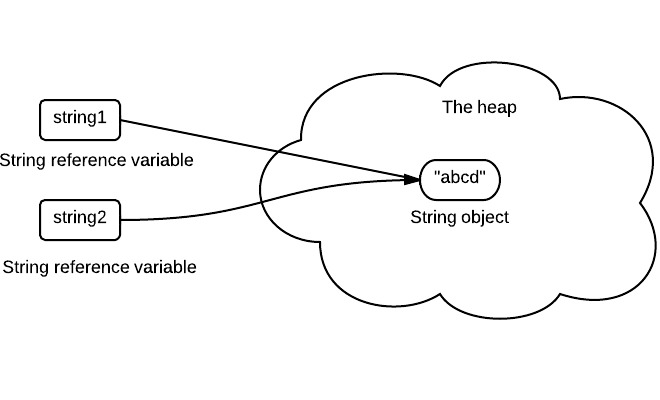Why Are Strings Immutable in Java? Recognizing the Core Principles
Wiki Article
Checking Out the Advantages of Immutable Strings in Modern Programming Paradigms
In the realm of modern-day programming paradigms, the idea of unalterable strings stands as a foundation of durable software program growth. By adopting unalterable strings, developers can make certain boosted information stability, enhanced string security, simplified debugging procedures, increased safety and security procedures, and effective performance optimization.Enhanced Information Stability

By avoiding the modification of string things, immutability gets rid of the threat of unintended adjustments to the information they hold. This not just boosts the safety and security of the info but also boosts the integrity of the code that relies on these strings.
Immutability also sustains much safer multithreading settings, as concurrent accessibility to unalterable strings does not present the risk of information corruption via simultaneous alterations. This residential or commercial property streamlines the procedure of handling strings in parallel shows circumstances.
Fundamentally, immutability serves as a protective guard around the information stored within strings, boosting their stability by guaranteeing that once defined, their worths stay unmodified throughout the program's implementation.

Boosted String Safety And Security
Immutable strings enhance the thread safety and security of programs by making sure that once a string things is created, its worth can not be customized. This building gets rid of the danger of concurrent strings trying to modify the very same string simultaneously, which could bring about information corruption or irregular states in the program - Why are strings immutable in Java?. In a multi-threaded environment, where multiple threads access and control data concurrently, the immutability of strings gives a level of safety by guaranteeing that the information remains the same throughout its lifecycleStreamlined Debugging Procedures
Given the boosted string safety promoted by immutable strings, a significant advantage occurs in the world of streamlined debugging processes. Unalterable strings, once produced, can not be altered, making it less complicated to trace the flow of information and identify the resource of insects in a program. This immutability makes sure that strings stay consistent throughout the execution of the program, minimizing the possibility of unforeseen changes that might result in errors.When debugging with mutable strings, developers often come across problems where a string's worth is changed unintentionally, making it testing to pinpoint the origin of an insect. However, with immutable strings, the information remains the same, enabling designers to focus on evaluating the real logic of the code as opposed to tracking down where and when a string was changed improperly.
In addition, unalterable strings simplify the debugging process by allowing simpler recreation of pests. Considering that immutable strings do not alter state, programmers can recreate and research pests a lot more successfully, bring about quicker identification and resolution of problems within the codebase. This streamlined debugging operations inevitably adds to higher software program high quality and boosted total growth effectiveness.

Increased Protection Steps
Enhancing data security and fortifying system integrity, the use helpful site of unalterable strings in software program applications adds dramatically to enhanced safety steps. Unalterable strings likewise play an important duty in stopping usual safety and security susceptabilities such as buffer overflows and SQL shot attacks, as efforts to adjust string information at runtime are naturally limited.Furthermore, the immutability of strings improves the predictability of program habits, making it simpler to validate inputs and stop unexpected modifications that could jeopardize safety and security. This predictability streamlines the procedure of bookkeeping and validating code, allowing programmers to identify potential security loopholes much more successfully. On the whole, including unalterable strings right into software advancement methods not just boosts the robustness and reliability of applications however additionally strengthens their durability versus safety risks.
Effective Efficiency Optimization
When dealing with mutable strings, operations like concatenation or substring production frequently result in the creation of brand-new string items, leading to memory expenses and boosted handling time. By allowing strings to continue to be consistent and unchangeable, immutable strings promote much better memory monitoring and caching chances, Bonuses inevitably increasing the overall effectiveness of the software.
Unalterable strings also play an essential duty in multithreaded atmospheres by promoting thread security. Why are strings immutable in Java?. Since unalterable strings can not be modified as soon as developed, they can be shared across strings without the risk of unforeseen changes, reducing the need for synchronization devices and enhancing concurrency. Additionally, immutable strings streamline debugging processes as developers can rely on that a string's worth will certainly stay regular throughout the program's execution, removing possible errors triggered by mutable state changes. Finally, making use of unalterable strings not just improves security but likewise significantly adds to the efficient performance optimization of modern software application systems.
Conclusion
Finally, the benefits of making use of unalterable strings in contemporary programs paradigms can not be overemphasized. Enhanced data stability, boosted thread security, simplified debugging procedures, raised safety and security procedures, and efficient performance optimization all add to the general efficiency of shows jobs. By integrating unalterable strings right into click here now shows techniques, programmers can gain from an extra dependable and robust codebase.Immutability, a key function of strings in programs languages such as Java and Python, makes sure that when a string things is produced, it can not be changed or changed.Unalterable strings improve the string security of programs by guaranteeing that once a string things is produced, its value can not be customized. Immutable strings also play an essential role in protecting against usual safety susceptabilities such as buffer overflows and SQL injection strikes, as efforts to control string data at runtime are inherently restricted.
By allowing strings to stay unchangeable and consistent, immutable strings facilitate better memory administration and caching possibilities, inevitably boosting the total effectiveness of the software program.
Immutable strings streamline debugging procedures as designers can rely on that a string's value will continue to be consistent throughout the program's execution, removing potential errors caused by mutable state modifications.
Report this wiki page